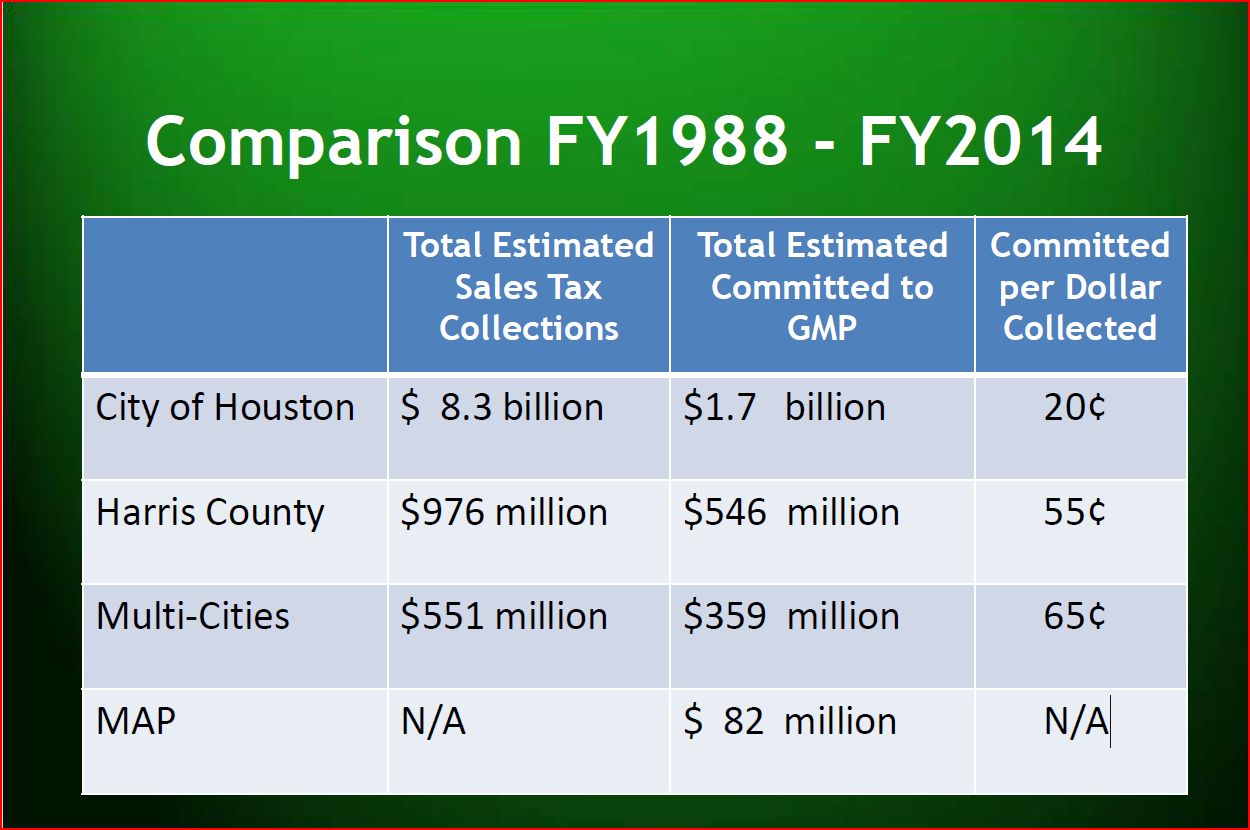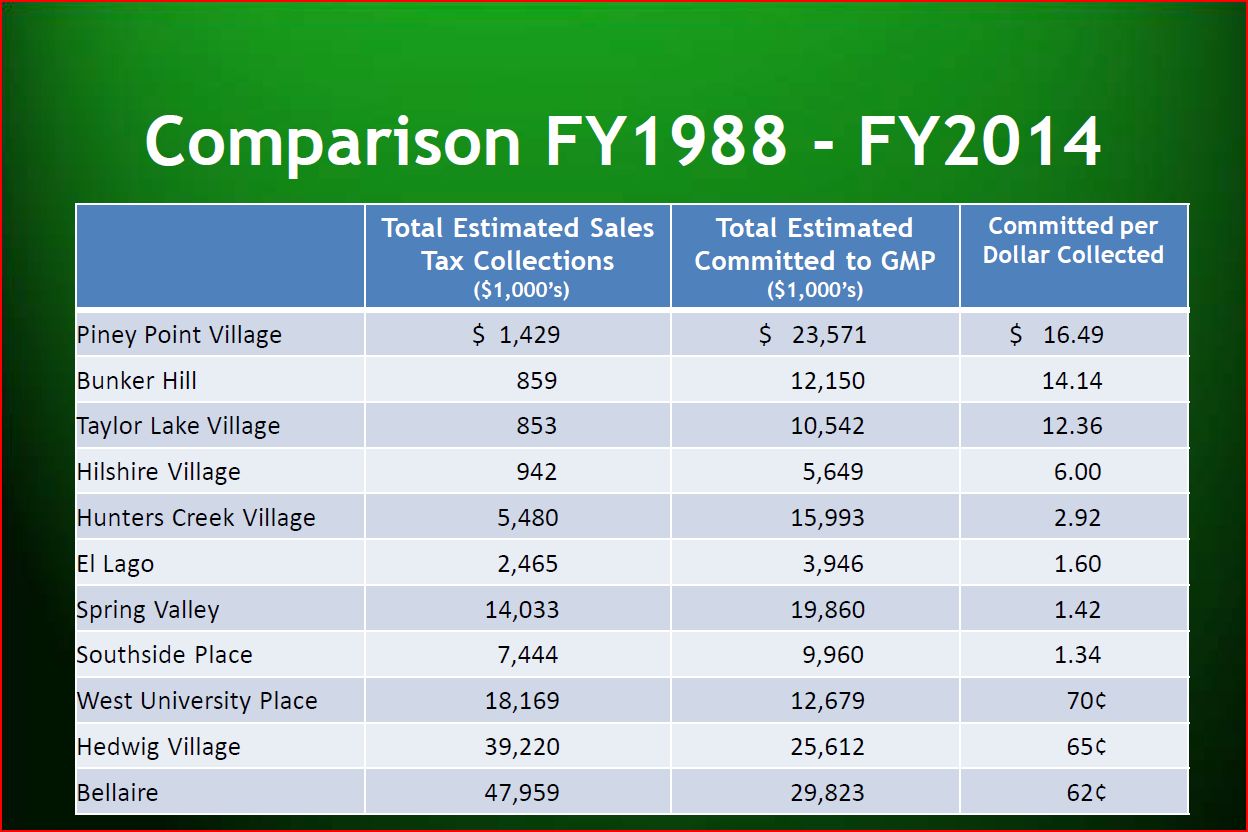The GMP is Metro’s General Mobility Program, which distributes funds for road projects to Houston, Harris County, and the smaller Metro member cities. The smaller cities like it as it is, don’t want any changes made to it, and claim they give more than their fair share. I called for some objective data to check that claim, and I got it. Two slides from that presentation sum it all up:
Yeah, that’s a pretty good deal for the small cities. In fairness to Missouri City Mayor Allen Owen, the chair of the small cities coalition, his own town gets a mere fifty-four cents on the dollar back from the GMP. I’m pretty sure Houston would take that deal. All these cities also get things like park and ride lots, MetroLift, and the benefit of the HOV lanes. Metro has spent a ton of money on the park and ride/HOV network. I suspect the motivation of the small cities is in part a belief that changing the formula means more will be spent on light rail, which being inside Houston doesn’t benefit them much, though again Missouri City stands to gain from future rail construction. The point is that the money Metro gets goes to a lot more than buses and light rail. I’m really hard pressed to see how altering that equation a little in favor of the latter is unfair to the current participants.



Wow, once again it looks like the people with higher incomes are being subsidized by people with lower incomes. I mean, just how many people depending on unemployment benefits live in Hunters Creek, West University Place and Piney Point Village? What this really means is that the Repugnants living in these not-so-desperately poor little cities don’t want to pay their fair share of taxes for anything provided by Metro. They don’t want light rail because it transports people who don’t look or vote like them. They would be very happy if Houston reverted to a privatized bus system that provides unreliable transportation in rickety buses for people too poor to buy a car. I seem to recall that the purpose of Metro was to get cars off the roads, thereby reducing congestion, air pollution, and the need to import oil. If you listen to some of these “light rail opponents” you get the impression that Metro was established to (1) provide convenient transportation to downtown Houston during rush hour for people living in The Woodlands and Kingwood and (2) run a shoddy bus system for people in Houston. One more point: it is time for Houston to start aggressively annexing appropriate unincorporated areas in Harris County in order to maintain control of the Metro Board.
It would be useful to know what the GMP money was spent on in the smaller cities. How much was spent on projects that essentially move people through those cities on their way from one part of Houston to another (Briar Forest, San Felipe, and Memorail come to mind for East-West routes, while Voss/Hillcroft, Wirt/Chimney Rock, and Fondren/Blalock would be the North-South routes) as opposed to projects that would only benefit the residents of the cities?
Don’t forget that the county has historically spent about 95% of the road and bridge funds they collect in unincorporated areas even though the residents of Houston and other Harris County municipalities contribute almost 60% of the money when registering or renewing their vehicles. More equitable distribution of those funds might offset any loss in growth of GMP payments to those cities, and they wouldn’t even have to be in the METRO service area to get it!
Pingback: Here come the GMP proposals – Off the Kuff
When you stop and think, and then realize, that Metro’s light rail serves less than 1% of those paying the taxes for it, it becomes much easier to understand why those paying for light rail , but receiving absolutely NO BENEFIT from it, would balk at paying even more for something they already receive no benefit from.
It’s like Houstonians being taxed to pay for Dallas’ roads, and then being asked to pay even more, for the same.
Is it really that hard to understand?
Perhaps if Metro would build comprehensive and cost-effective Commuter Rail between the central city and the suburbs, everyone could get behind it.
I know I would.
G.F. Brown
BFG Consulting
PTSolutions
Houston, Texas
@ Ross :
I would suggest that those cities spend the majority of their GMP on those very projects that you mention : The through streets that move HOUSTONIANS through those smaller cities.
@ Temple Houston :
So just more whinin’ and cryin’ and name-callin’ and division?
Is that all you got?
What.
No facts?
G.F. Brown
Houston, Texas
from Charles Kuffner’s post above :
” Metro has spent a ton of money on the park and ride/HOV network.”
Mr. Kuffner, I’m thinking that “ton of money” would have built an awful lot of Commuter Rail.
In fact, why don’t we take all of the Toll Road money, combine it with Metro’s light rail money, and build a magnificent, and cost-effective, Commuter Rail system that would connect ALL of the Greater Houston Region together?
Mr. Kuffner, you are aware that Austin, Texas has built over 32 miles of Commuter Rail at a cost of only $5 million p/mile, aren’t you?
And that Metro’s light rail is costing us over $150 million p/mile?
That’s 30 times more efficient.
No one thinks we have transit money to waste on inefficiencies, do they?
G.F. Brown
Austin’s commuter rail line is a joke. It does not serve the city’s largest employment centers and its ridership is weak (less than 2,000 pax/day, according to the APTA’s first quarter stats). I wouldn’t use that as an example, as it shows what you get when you try to build “on the cheap.”
Pingback: The Radack way – Off the Kuff